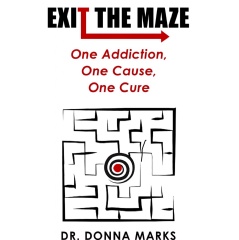Addiction Expert Claims the Holidays Can Be Another Addiction
The holidays are the time of the year when people are more apt to engage in addiction or even relapse, often resulting in the holiday blahs and blues rather than building happy memories. Dr. Donna Marks, psychoanalyst, addictions counselor and author of “Exit the Maze - One Addiction, One Cause, One Cure,” (released in 1/20, Amazon.com) believes that the holidays themselves can be just another addiction. She defines an addiction as anything that a person repeatedly does in spite of negative consequences, and that all addictions are merely a substitute for love. Marks asserts that for many, the holidays’ positive expectations and depressing aftermath are no different.
Greater threat than global warming. One hundred million people in the U.S. alone are addicted.[1] Addiction starts in the mind—the way we are conditioned without ever even knowing that our minds are being hijacked. Early on, unconscious programming begins through advertising and learned anticipation, and the yuletide season is no different. Even before Halloween, the subliminal messages start invading our thoughts—time to start getting ready—guest list, gift list, food list… The expectation is set that the holidays bring parties, gifts, and escape from the everyday ho-hum-living toward anticipation and excitement. Santa’s arriving on his toy-filled sleigh, bubbly Champagne will make it snow, diamonds will open the skies of romance.
A holiday crash. “So, what’s wrong with entertaining, gift-giving and a little extra merriment, you might ask,” Marks queries. Nothing at all until the desire to have fun overrides all sense of reality, and the consequences result in over-extending, over-indulging, and over-spending—all leading to a holiday emotional crash rather than holiday uplifting joy.
A time to connect. You can have your best holiday ever by being conscious of what you are doing rather than being driven by an unconscious desire that has no tangible fulfillment. When you are eating and drinking, be mindful of each flavor and savor the taste—you are likely to be more satisfied. If you are in recovery, you don’t have to relapse to have a good time, you can spend your time focusing on others, rather than dwelling on something that isn’t good for you. Set limits on spending and stick to them. One special gift or a few thoughtfully selected (or even homemade) items are far more meaningful than an abundance of ready-made store-bought items. And if you are wrapping gifts, put a little TLC into making a pretty package. Including someone who is alone in your plans is an act of kindness that brings a lasting memory. And finally, the most important gift you can give yourself or anyone else is the gift of time. These acts of love won’t be over-ridden with debt, guilt, and remorse, and will provide memories of genuine happiness that far exceed those created by an addictive-mindset.
[1] “Alcohol Facts and Statistics,” National Institute on Alcohol Abuse and Alcoholism, updated August 2018, www.niaaa.nih.gov/alcohol-facts-and-statistics.
( Press Release Image: https://photos.webwire.com/prmedia/68701/251081/251081-1.jpg )
WebWireID251081
- Contact Information
- Dr. Donna Marks
- Author, Psychotherapist
- drdonnamarks@gmail.com
This news content may be integrated into any legitimate news gathering and publishing effort. Linking is permitted.
News Release Distribution and Press Release Distribution Services Provided by WebWire.
